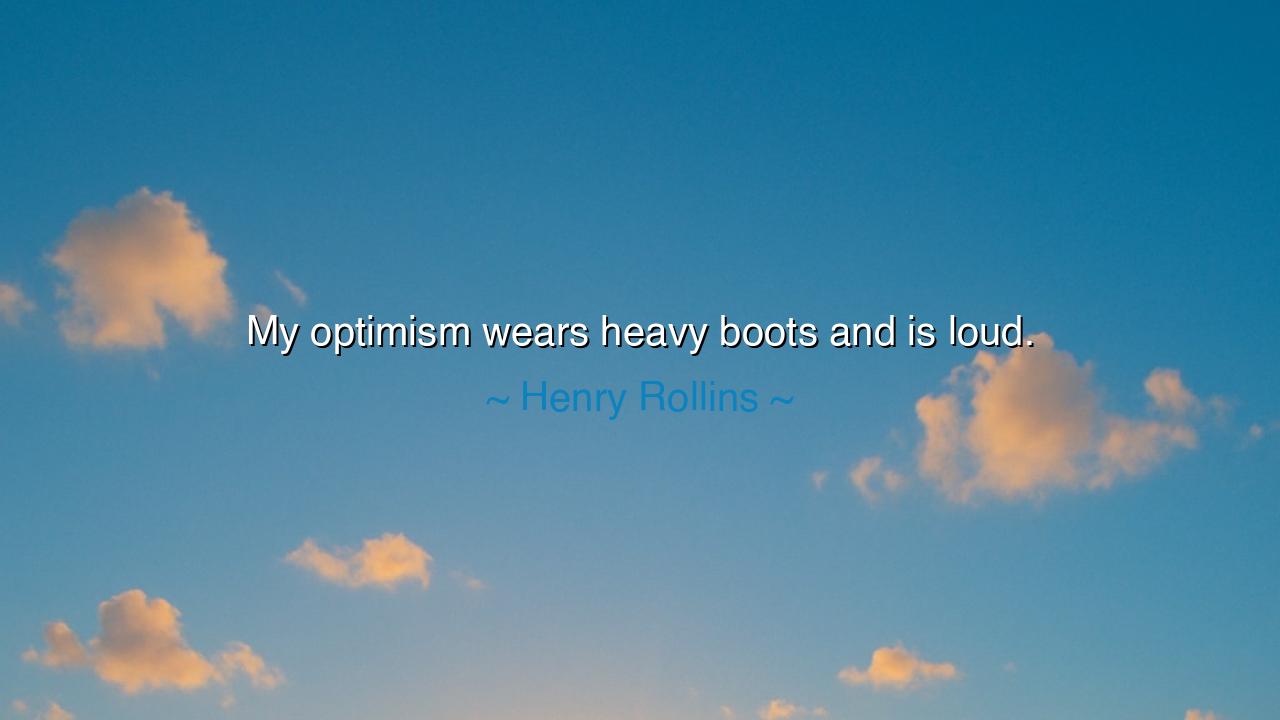
My optimism wears heavy boots and is loud.






Hear, O children of resilience, the fierce words of Henry Rollins: “My optimism wears heavy boots and is loud.” This is no soft saying meant to comfort idle hearts, but a battle-cry, born of struggle, sweat, and scars. Rollins, who rose from hardship and carved his name in the fire of music and art, tells us that hope is not always gentle. It is not always a whisper in the dark. Sometimes, true optimism must march, must thunder, must shake the earth beneath its steps.
The meaning is clear: many think of optimism as fragile, a delicate flower swaying in a storm. But Rollins rejects this frailty. His is an optimism with iron soles, stomping into the world with force, announcing its presence with a roar. For the one who has suffered, who has seen despair and tasted defeat, hope must be more than a quiet thought. It must be strength embodied, a determination so fierce that it refuses to be ignored. Optimism, then, is not passive—it is an act of defiance, a declaration of survival.
History offers us mighty examples. Consider Winston Churchill in the dark days of World War II. The bombs of the enemy fell upon London, shadows of ruin stretched across Europe, and fear sought to devour nations. Yet Churchill stood before his people with words that thundered like heavy boots: “We shall never surrender.” His optimism was not fragile, not soft—it was loud, unyielding, a weapon in itself. And because of that defiant hope, a nation endured, and light broke through the darkness.
This is the kind of hope Rollins speaks of: one that is not ashamed of its noise, one that does not apologize for its strength. To wear heavy boots is to tread forward even when the ground shakes, to leave behind footprints so deep that others may follow. To be loud in optimism is to declare to the world—and to oneself—that despair will not be the final word. It is optimism as armor, optimism as thunder, optimism as a weapon sharper than fear.
Yet this teaching is not only for leaders or warriors, but for every soul who faces hardship. When illness strikes, when betrayal wounds, when failure weighs heavy—there is a temptation to whisper hope only timidly, to hide it lest it be mocked. But Rollins calls us to a bolder path. Let your optimism speak with power. Let it fill the room. Let it echo so loudly that even your enemies hear it and tremble. For to believe quietly may save yourself, but to believe loudly may inspire a multitude.
The lesson is eternal: do not treat hope as fragile china to be tucked away. Treat it as a hammer, as a drum, as marching boots that carry you through the battlefield of life. Speak your vision of better days. Act boldly in faith. Refuse to let despair drown your voice. Be noisy in your joy, relentless in your belief, unapologetic in your courage. For such optimism is not only for your own survival—it becomes a beacon, a rallying cry for others who walk in darkness.
Practical steps follow. When you face adversity, declare your intent out loud—I will endure. I will rise. I will overcome. Write your goals not as timid wishes, but as bold decrees. Surround yourself with voices that amplify hope, not those that smother it. Step into each day with action, not hesitation, as though wearing heavy boots that will not be stopped. And when life tries to silence you, raise your voice higher, for sometimes the world must hear your optimism before it believes it is possible.
Thus the words of Henry Rollins stand as a commandment for warriors of the soul: “My optimism wears heavy boots and is loud.” Remember this, O listener: the truest hope is not fragile—it is fierce. The truest faith is not silent—it is thunder. Walk boldly, believe loudly, and let your footsteps shake the earth for generations to come.






MNMilusa Nguyen
This statement really stands out because it reframes optimism as an act of strength, not just positivity. It makes me wonder—can optimism be a form of rebellion? In a culture that often glorifies sarcasm or pessimism, choosing to be hopeful and vocal about it feels almost radical. Do you think optimism like this can inspire real change, or does it sometimes get mistaken for overconfidence or stubbornness?
DBKiet Dang Ba
I feel this quote perfectly captures the kind of optimism we need today—resilient and vocal. But at the same time, I’m curious if being ‘loud’ about optimism could ever come across as dismissive of people’s struggles. How can someone express confidence and hope loudly without sounding insensitive to those who are struggling to find any? Maybe the key lies in being passionate but empathetic at the same time?
HADao Thi Hong Anh
There’s something really intriguing about describing optimism as wearing ‘heavy boots.’ It gives it a kind of toughness, like it’s not afraid to get messy or walk through difficult places. I wonder if Rollins meant that true optimism isn’t delicate—it’s built to endure hardship. What do you think? Is strong optimism something we cultivate through experience, or is it a natural personality trait some people just have?
MNNguyen Man Nhi
This quote makes me think about the idea of optimism as something bold and unapologetic rather than quiet or naïve. I like that it challenges the stereotype of optimism being soft or passive. Do you think optimism has to be loud to be effective in a world filled with negativity and cynicism? Or can quiet optimism be just as powerful, even if it’s not as visible or assertive?